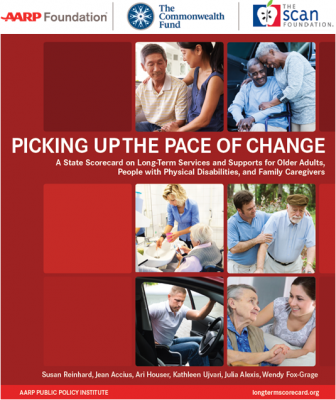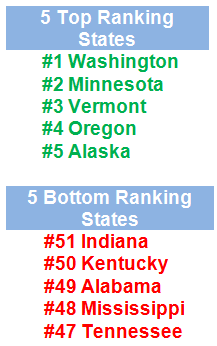Washington State and Minnesota are top-ranked states again, but all states lag in helping care for the growing populations of people aging and living with disabilities.
WASHINGTON, DC—With baby boomers beginning to turn 80 in 2026, states must accelerate the pace of improving long-term services and supports (LTSS) for older people and adults with disabilities, according to AARP’s new state scorecard released today. The report, Picking Up The Pace of Change: A State Scorecard on Long-Term Services and Supports for Older Adults, People with Physical Disabilities, and Family Caregivers (“Scorecard”), shows that although most states have made some progress, the pace of change overall remains too slow and has not kept up with demographic demands.
LTSS include assistance with activities of daily living provided to older adults and people with disabilities who cannot perform these activities on their own because of physical, cognitive, or chronic health conditions. The types of assistance include such things as help with bathing, dressing, managing medications, preparing meals, and transportation, as well as support for family caregivers.
“This Scorecard sounds the alarm, but it also provides a range of tools states can use to spark new solutions and create systems that are aligned with the new realities of aging and living with a disability,” said Susan Reinhard, RN, PhD, Senior Vice President and Director, AARP Public Policy Institute. “The proposed cuts to Medicaid—the largest public payer of long-term assistance—would result in millions of older adults and people with disabilities losing lifesaving supports.”
The Scorecard was funded by AARP Foundation, The Commonwealth Fund, and The SCAN Foundation. This is the third edition of the Scorecard.
How States Are Ranked
The Scorecard ranks states based on their performance on LTSS in five main categories:
- Affordability and access
- Choice of setting and provider
- Quality of life and quality of care
- Support for family caregivers
- Effective transitions between nursing homes, hospitals and homes
Within the five categories, states are scored on their performance in 25 specific indicators, including such things as Medicaid spending, nursing home cost, home health aide supply, antipsychotic medication use in nursing home residents, long nursing home stays, employment rate of people with disabilities, and support of working caregivers. (See report for full list.)
“This new Scorecard shows that it’s time for all states to accelerate care improvements for older adults and people with disabilities,” said Bruce Chernof, MD, FACP, President and CEO of The SCAN Foundation. “States that consistently rank at the top have strategically planned for their aging population across the main sectors of health, housing, transportation and family caregiving.”
Good News/Bad News
Overall, states made incremental LTSS improvements since the previous report in 2014, but the pace of change has been slow and uneven. However, two states—Tennessee and New York—showed the most improvement across measures since the last Scorecard.
States made the most significant progress in reducing inappropriate ‘off label’ use of antipsychotic medications among nursing home residents and increasing support of family caregivers.
In general, states showed the most significant declines in employment rates for people with disabilities and rates of transitioning long-stay nursing home residents back into the community. Notably, the majority of states showed no real change on ‘Affordability and Access,’ meaning that the cost of LTSS over time continues to be much higher than what the majority of families can afford.
Looking Ahead
“Millions of baby boomers will be facing greater health needs over the next few decades, and this scorecard shows we are still falling short of where we need to be to address those needs,” said Commonwealth Fund President David Blumenthal, M.D. “We need to begin now to make care for elders and people with disabilities more available in homes and communities—where many people prefer to be—instead of in institutions like nursing homes.”
Ideally, all states would have high-performing LTSS systems in which older adults and people with disabilities:
- Can easily find and afford needed services;
- Have choices in both services and providers;
- Have access to quality care to help maintain their quality of life;
- Avoid unnecessary hospitalization and nursing home stays; and
- Receive help from family caregivers, whose needs are addressed and supported.
To view the full report, go to www.longtermscorecard.org.
# # #
About AARP
AARP is the nation’s largest nonprofit, nonpartisan organization dedicated to empowering Americans 50 and older to choose how they live as they age. With nearly 38 million members and offices in every state, the District of Columbia, Puerto Rico, and the U.S. Virgin Islands, AARP works to strengthen communities and advocate for what matters most to families with a focus on health security, financial stability and personal fulfillment. AARP also works for individuals in the marketplace by sparking new solutions and allowing carefully chosen, high-quality products and services to carry the AARP name. As a trusted source for news and information, AARP produces the world’s largest circulation publications, AARP The Magazine and AARP Bulletin. To learn more, visit www.aarp.org or follow @AARP and @AARPadvocates on social media.
About AARP Foundation
AARP Foundation works to ensure that low-income older adults have nutritious food, affordable, livable and healthy housing, a steady income, and strong and sustaining bonds. We collaborate with individuals and organizations who share our commitment to innovation and our passion for problem-solving. Supported by vigorous legal advocacy, we create and advance effective solutions that help struggling older adults transform their lives. AARP Foundation is the affiliated charity of AARP. Learn more at aarpfoundation.org.
About The SCAN Foundation
The SCAN Foundation is an independent public charity devoted to transforming care for older adults in ways that preserve dignity and encourage independence. We envision a future where high-quality, affordable health care and supports for daily living are delivered on each person’s own terms, according to that individual’s needs, values, and preferences. For more information, visit www.TheSCANFoundation.org.
About The Commonwealth Fund
The Commonwealth Fund is a private, nonprofit foundation supporting independent research on health policy reform and a high performance health system. Learn more at www.commonwealthfund.org
For further information: Greg Phillips, AARP, 202-434-2560, media@aarp.org, @AARPMedia
Rachel Griffith, The SCAN Foundation, 202-868-4824, rgriffith@messagepartnerspr.com
Mary Mahon, The Commonwealth Fund, 212-606-3853, mm@cmwf.org

































































